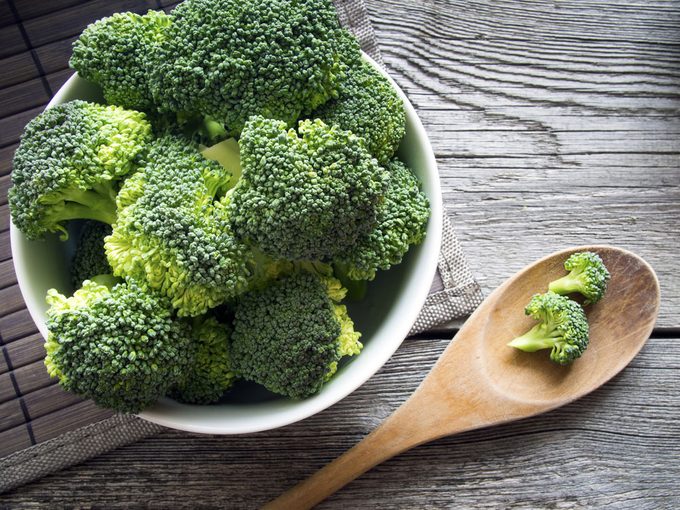The Health Benefits of Broccoli: How This Common Food Protects Against Cancer
Many people are put off broccoli by its bitter, peppery flavour. But the chemicals that produce that taste have health benefits that include protecting against several kinds of cancer – making this vegetable something of a wonder food

Source: The Amazing Healing Powers of Nature, Reader’s Digest
Broccoli has health benefits beyond nutrition’it’s also cancer fighting
Broccoli (Brassica oleracea) may be used in your favourite side dish or slaw’you already know it’s healthy, but did you know it can protect against cancers of the prostate, lung, colon, cervix, pancreas and breast?
There are even positive results for people who have already had cancer. In a 2012 study, breast cancer survivors who consumed high levels of cruciferous vegetables, such as broccoli had a significantly reduced level of disease recurrence and mortality.
What’s so healthy about broccoli?
When you cut or chew a piece of broccoli, you start a chain reaction: an enzyme called myrosinase breaks down chemicals in the broccoli cells called glucosinolates. One by-product is an organic compound called sulforaphane, which is present in all brassicas or cruciferous vegetables (such as cabbage, cauliflower, Brussels sprouts, kohlrabi, turnip, rutabaga and kale) but particularly rich in broccoli. Sulforaphane contains sulphur and is partly responsible for broccoli’s pungent aroma and flavour.
Sulforaphane benefits the body in several ways: it inhibits the activity of an enzyme called HDAC, which can interfere with beneficial gene activity and it also blocks the formation of fibres that enable cancer cells to divide, thereby preventing those cells from proliferating. And while the formation of cancerous cells usually turns off a process called DNA methylation’which is vital for normal cell development’sulforaphane switches it back on.
As well as sulforaphane, broccoli is rich in phytochemicals, fibre, folate, minerals and vitamins, especially vitamins C, K and A.
RELATED: 10 Foods You Should Eat Every Day
How to get the medical benefits of broccoli
Experts suggest eating about 5 ounces (150 grams)’essentially a large cupful a day’of broccoli to get the full nutritional health benefits. If you balk at this bulk, try 2 tablespoonfuls of broccoli sprouts a day instead’they contain up to 50 times the level of protective compounds as the adult plant.
Most broccoli supplements are not effective, as they lack the crucial myrosinase enzyme, so skip the health food store and stick to the grocery store for this one.
Medical studies and research on sulforaphane
About 20 years ago, Professor Paul Talalay and his colleagues at Johns Hopkins School of Medicine discovered that sulforaphane has some remarkable effects on cancer cells in animals.
At the time, the idea of being able to prevent cancer was controversial. But for Talalay it made sense. He knew that every living plant contains chemicals that protect it against a barrage of attacks from predators and infection and he thought that, by eating fruit and vegetables, humans might also benefit from this disease-fighting mechanism. Focusing on brassicas, the researchers tested more than a dozen vegetables for the presence of beneficial compounds. They discovered that sulforaphane in particular, when added to cultured rat liver cells, stimulated the cell’s ability to neutralize cancer-causing chemicals.
RELATED: Immune-Boosting Broccoli Soup
Since that time many studies have shown that glucosinolates and their breakdown products, such as sulforaphane, stop cancer cells from proliferating. In cell cultures, sulforaphane especially has been shown to cause the destruction of many types of human cancer cells, including pancreatic, colon, prostate and cervical cancer cells. It inhibits the growth of pancreatic tumours in mice, and early studies also suggest it may protect heart tissue from inflammation and atherosclerosis.
However, much of this early research was done in laboratory animals or in cell cultures, where sulforaphane is added directly to a dish of cancer cells. What’s far more complex to unravel is whether eating broccoli will suppress tumour growth in a living person. One of the first studies to provide strong evidence that diet does have an effect was a 2008 UK study by the Institute for Food Research. The researchers found that men who consumed more than one portion of cruciferous vegetables each week had a lower incidence of prostate cancer.
Also in 2008, a study at the Roswell Park Cancer Institute found that smokers and former smokers who regularly ate broccoli and its relatives were less likely to develop lung cancer. A smoker may ingest 500 or so chemicals in a single inhalation and it may be that sulforaphane or another chemical stimulates enzymes to break down carcinogens in smoke.




